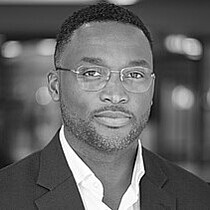Chris Koehler
Programme: EMBA Class of 2020
Nationality: Dutch, born and raised in Togo
Age: 32
Job title: partner at FFUND
Previous degree: Vrije Universiteit Amsterdam, master management policy analysis and entrepreneurship in the health and life sciences. Specialised in international public health, entrepreneurship and management in the life sciences.
Chris grew up in Togo with his parents and four brothers. He came to the Netherlands with his family at the age of 10. He now lives in Alphen aan den Rijn, and likes reading about everything related to politics on the African continent, and working on and riding motorcycles.

1. Why did you decide to do an MBA?
“My study background involved a lot of qualitative and quantitative research. This helped me in my early career to assess issues and find ways of solving problems in a structured manner. But with time, I noticed that I’d like more managerial knowledge and a basis I can build on to go forward. The EMBA is in my opinion the best option if you want to achieve this goal and expand your network. RSM is one of the top universities in Europe, and I like the international aspect of the class. So this decision was easy.”
2. How are you managing to balance studying with work?
“After work I start my EMBA assignments at 21:00 until about 23:30. I can easily go with only seven hours of sleep. For now this works, but the next blocks are supposed to be more challenging. I’m curious to see how I’ll cope.”
3. How is the EMBA experience affecting your tasks at work?
“It broadens your perspectives. After each EMBA weekend, you start to see issues in a new context with a broader scope and you become a better conversation partner with clients and colleagues. I’ve also learned that you really need to study and do your best to find as much information as possible to make well thought-through decisions. I want to know facts through my own research, and challenge what is being said. I like that.”
4. What has been the best part of the EMBA so far?
“The study trip to South Africa was an eye-opener. I thought I knew what to expect but being there in an EMBA context and going to the townships introduced me to other aspects of the challenges in the country. It really humbled me. The EMBA shows you that you need to be more aware of your blind spots and that you don’t know it all. Experiencing what I thought about South Africa, and seeing what it actually is – and coming back with more questions – really shows the impact of the programme.”
5. What is the biggest challenge of the Executive MBA?
“Working in teams with people from various backgrounds. You’re in a group with six smart people with different ideas and ways of working, and no clear leader. It takes political agility to collaborate without insulting each other and still come out with a good final product. In the end it all works out and you make friends for life. But it takes a conscious effort to get there.”
6. How do you hope the RSM MBA helps you to be a force for positive change?
“Coming from West Africa from a politically active family, this mission resonates with me. RSM focuses on creating professionals with a high level of sensitivity. This automatically results in an alumni network that is geared towards realising this goal. Ultimately, I believe that the power of this large network will help us leverage this ambition. As EMBA students, we’re part of this – now and in the future.”
7. After the Executive MBA, what does the future hold?
“First, to use my skills to be a successful partner at FFUND. In a more distant future, I might move back to West Africa. There, I want to help build a bridge between that region of the world and Western Europe as I believe that we must solve issues facing the world together.”